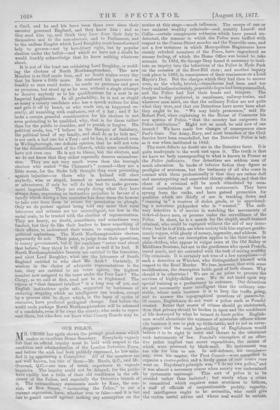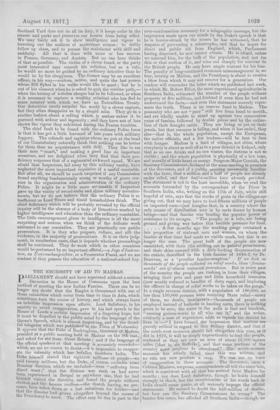OUR POLICE.
1VER, CROSS has again shown the prompt good-sense which makes an excellent Home Secretary. Everybody vaguely felt that an official inquiry must be held with respect to the condition and administration of the London Detective Force, and before the wish had been publicly expressed, he has satis- fied it by appointing a Committee. All of the members are not well known, but two of them—Mr. Malik, Q.C., and Mr. Overond, Q.C.—are men of much experience in cognate inquiries. The inquiry could not be delayed, for the public have visibly lost a little of their old confidence in the effi- ciency of the Police, and especially the Detective branch of it. The extraordinary statements made by Kurr, the con- vict, at Bow Street, " decimating the Police," to use a current expression, have, whether true or false—and it is but fair to guard oneself against making any assumption on the matter at this stage—much influence. The escape of one or two eminent wealthy criminals—and notably Lizardi and Collie—certain conspicuous robberies which have passed un- detected, the manner in which the Police were baffled with respect to the Coram-Street murder and the Tourville case, and not a few instances in which Metropolitan Magistrates have sternly rebuked members of the Force, have engendered an uneasy feeling, of which the Home Office was bound to take account. In 1854, Sir George Grey found it necessary to insti- tute an inquiry into the behaviour of the Police in Hyde Park on the occasion of the Beer-Bill riots ; and another inquiry took place in 1863, in consequence of their remissness on a Lord Mayor's Day. But the charges which they had then to answer were, on the whole, trivial,—truncheons had been used too freely and indiscriminately, peaceable lieges had been pummelled, and the Police had lost their heads and tempers. The charges to-day preferred, in omnibuses, railway-trains, and wherever men meet, are that the ordinary Police are not quite what they were, and that our Detectives have never been what they ought to be. " We may fairly pronounce," said Sir Robert Peel, when explaining to the House of Commons his new system of Police, " that the country has outgrown its Police institutions." Might not as much be said now of one branch ? We have made few changes of consequence since Peel's time. Our Army, Navy, and most branches of the Civil Service have been remodelled, but the Detective Police is left as it was when instituted in 1842.
The main defects no doubt are in the Detective force. It is quite inadequate to the work cast upon it. The truth is that we have no body corresponding to what is known in France as the Police judiciaire. Our detectives are seldom men of much education. In books of inferior fiction they figure as prodigies of acuteness, but the testimony of all who come in contact with them professionally is that they are rather dull and unenterprising and somewhat thirsty officials, and that the chase of a criminal will be much stimulated by occa- sional consultations at bars and restaurants. They have sprung from the ranks, and have gained promotion for qualities which are Chiefly of use in tracking down and "running in" a receiver of stolen goods, or in apprehend- ing a notorious pickpocket who is " wanted." The ordi- nary detective is of service in watching the movements of ticket-of-leave men, or persons under the surveillance of the Police. In short, he is a match for the stupid, small-brained criminal, who could be captured without the aid of any detec- tives ; but he is of little use when society bids him capture gentle- manly rogues, with plenty of money, ingenuity, and address. It may be said that our description applies to the thief-takers in plain-clothes, who appear in vulgar cases at the Old Bailey or Middlesex Sessions, but not to the gentlemen who speak French, travel much, and are entrusted with the task of seizing wealthy City criminals. It is certainly not true of a few exceptions—of such a detective as Whicher, who distinguished himself with respect to the Road Murder. We fear, however, that with some modifications, the description holds good of both classes. Why should it be otherwise ? We are at no pains to procure the i services of highly-skilled men. We do not insist upon any special training as a preliminary to entrance. Our detectives are not necessarily more intelligent than the ordinary con- stable, whose main business it is to keep the traffic going, and to answer the topographical questions of passers-by. Of course, Englishmen do not want a police such as Fouch4 created. Better that scores of crimes should go undetected, than that privacy should be broken in upon and the confidence of life destroyed by what he termed la haute police. English- men would abominate the existence of miserable officers whose vile business it was to pick up tittle-tattle, and to act as eaves- droppers ; and the most law-abiding of Englishmen would believe it to be right to resist and thwart to the uttermost such instruments of law. Fouch4's conception of an effec- tive police implied vast secret expenditure, the means of which were procured by black-mail. No instrument was too vile for him to use. In self-defence, his enemies— nay, even his master, the First Consul—were compelled to organise a centre police, and a lively game of ruse contre ruse went on. Napoleon's principle was, " I do my own police," and it was almost a necessary course when society was undermined by systematic espionage. This sort of police is to be avoided rather than imitated ; but surely when a crime is committed which requires some acuteness to fathom, a staff of officials of unquestionable probity, sagacity, and intelligence ought to be accessible, who could give the victim useful advice and whose zeal would be certain.
Scotland Yard does not do all its duty, if it keeps order in the streets and parks and preserves our houses from being rifled. We may fairly ask it to show intelligence and vigour in ferreting out the authors of mysterious crimes ; to deftly follow up clues, and to pursue the malefactor with skill and assiduity. All that is done with more or less success in France, Germany, and Austria. But no one hero thinks of that as possible. The victim of a clever fraud, or the party most interested may consult his solicitor, but as a rule, he would no more be guided by an ordinary detective than he would be by his clergyman. The former may be an excellent officer, in his way—zealous, active, and quite the last person whom Bill Sykes in his walks would like to meet ; but he is out of his element when he is asked to quit the routine path,— when the history of a stolen cheque has to be followed, or when it is necessary to capture a wealthy criminal who has fled to some country with which we have no Extradition Treaty. Our detectives rarely surprise the world by a clever capture, but they often disappoint us by a stupid miss. They go in a routine fashion about a calling which is useless unless it be pursued with ardour and ingenuity ; and they have not of late shown the vigour they exhibited during the Fenian troubles.
The chief fault to be found with the ordinary Police force is that it has got a little leavened of late years with military foppery. The colonels and captains whom we put at the head of our Constabulary naturally think that nothing can be better for them than an acquaintance with drill. They like to see their men " smart," and making a good lino on important occasions, and are delighted when they find that their pro- ficiency surpasses that of a regimental awkward squad. We are afraid that Inspectors, led away by this military vanity, have neglected the more important requisites of a useful constable. But after all, we should be much surprised if any Commission found anything fundamentally wrong or worthy of grave cen- sure in the organisation and administration of the ordinary Police. It might be a little more serviceable if Inspectors gave up the vanity of sword-belts and sham military accoutre- ments, but we do not believe that the ordinary Police is so inefficient as Lord Truro and timid householders think. The chief deficiency which will be probably revealed by the official inquiry will be the absence of a body of Detectives marked by higher intelligence and education than the ordinary constables. The little encouragement given to intelligence is all the more surprising and serious, when we think of the delicate work entrusted to our constables. They are practically our public prosecutors. It is they who prepare, collate, and sift the evidence, in the majority of prosecutions. It is on their judg- ment, in numberless cases, that it depends whether proceedings shall be continued. They do work which in other countries would be performed by an important official,—a Jugs d'Instruc- Lion, an Untersuchungrichter, or a Procurator Fiscal, and we are content if they possess the education of a national-school boy.



































 Previous page
Previous page